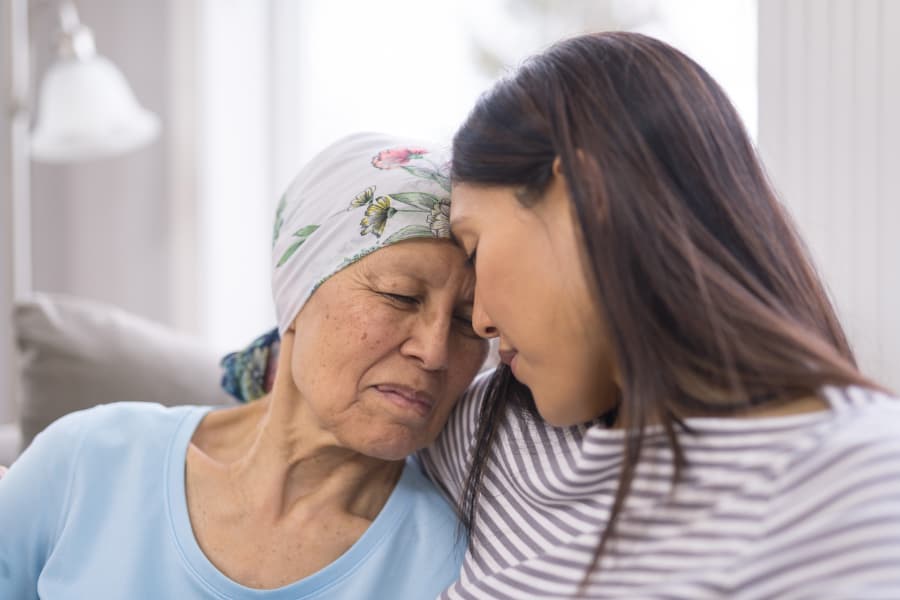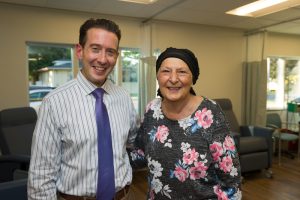
Early Signs of Inflammatory Breast Cancer
Regional Cancer Care Associates (RCCA) provides comprehensive treatment of cancer and blood disorders to patients throughout New Jersey, Connecticut, Maryland, and the Washington, DC, area.
HIPAA Alert: Potential Data Breach Learn More
Questions on Oncology, Hematology and/or Infusion Clinical Services due to COVID-19 Crisis – CALL 833-698-1623
Important Information for Our Patients Regarding the Coronavirus.
RCCA Providing Area Cancer Patients with Access to Care During Coronavirus Outbreak
RCCA Offering Patients Virtual Visits During Coronavirus Pandemic
When treating any form of cancer, early detection is essential, and breast cancer is no exception. The sooner breast cancer is identified, the sooner patients can receive treatment, and the more likely that treatment is to work. This is why women receive routine mammograms. It is also why individuals should understand breast cancer risk factors. When people know they are at risk, they can seek more frequent screenings to detect problems as they arise.
If and when a patient is diagnosed, many turn to Regional Cancer Care Associates. RCCA is a group of more than 100 medical oncologists and hematologists who treat patients who have solid tumors, blood-based cancers and benign blood disorders at 25 locations throughout New Jersey, Connecticut, Massachusetts, Maryland, and the Washington, DC area. They strive to educate patients while providing innovative care.
According to the Breast Cancer Research Foundation, a woman is diagnosed with breast cancer every two minutes in the United States.
As one of the most common cancers in the U.S., breast cancer affects about one in every eight women. It also affects about 2,500 men each year. If you or a loved one is battling with or recovering from breast cancer, the specialists at Regional Cancer Care Associates (RCCA) can help. Serving New Jersey, Maryland and Connecticut, we’re committed to offering patients state-of-the-art services and all the information they need to make the best medical decisions.
Breast cancer is one of the most common cancers diagnosed in the United States. According to the American Cancer Society, about 316,950 new cases of invasive breast cancer are diagnosed each year. One in eight women will develop breast cancer at some point in their lives. This means the average woman has a 13% chance of developing breast cancer. The disease is also the second leading cause of cancer death in women, with only lung cancer causing more fatalities.
Fortunately, breast cancer death rates have been in decline since 1989, with a massive 44% decline between 1989 and 2022. The decrease is in part due to better treatments. Another major cause of decline, however, is increased awareness and early detection. This is why understanding breast cancer risk factors is so important.

Anybody can develop breast cancer. However, certain factors can increase a person’s likelihood of breast cancer. Some of these factors can be controlled or reduced through individual choices, while others cannot. Common breast cancer risk factors include:
The risk of breast cancer steadily increases as people age. Most patients with breast cancer are diagnosed after age 40. The median age of diagnosis is 62 years old for women and 67 for men, with people age 70 and older facing the highest risk. Certain developmental milestones may also affect a person’s risk. If a woman started menstruation before age 12 or started menopause after age 55, she may be more likely to develop breast cancer.
More women get breast cancer than men. It is important to remember, however, that men may also develop breast cancer. When men do, it is often detected in later stages than in women. This is largely due to lower awareness in men, who are not encouraged to receive routine screenings or taught how to conduct self-examinations.
Certain inherited genetic mutations, such as BRCA1 and BRCA2 genes, are known risk factors for breast and ovarian cancer. Other, less common mutations that may increase cancer risks include ATM, TP53, PTEN, and STK11. RCCA offers genetic testing and counseling to help individuals understand when there might be at risk of developing breast cancer.
If a person has been diagnosed with breast cancer at least once before, there is a higher risk of the cancer recurring either in the same or the other breast. Similarly, a person’s risk increases if a first-degree relative has been previously diagnosed with breast cancer. First-degree relatives include children, parents, and siblings.
Dense breasts contain more connective tissue and less fat. Because most breast cancer starts in connective tissue, a higher percentage corresponds to a higher risk. It may also be more difficult to detect cancer in dense breasts, as mammogram imaging shows tumors less clearly. New technologies, however, are making it easier to examine dense breast tissue. Specialists frequently use 3D mammography and ultrasounds to improve breast cancer detection.
Women who become pregnant at an early age or who become pregnant after age 30 face a higher risk of developing breast cancer. Women who have never carried a pregnancy to full term are also at higher risk of breast cancer, as are women who never breastfed.
Diethylstilbestrol (DES) was frequently prescribed for pregnant women from 1940 to 1971 to prevent miscarriage. Women who have used DES have a higher risk of developing breast cancer. If a woman’s mother used DES while pregnant with her, she may also have a higher risk of breast cancer.
Some hormonal treatments may also cause a higher cancer risk. These include hormonal contraceptive methods, as well as the use of progestin or estrogen in post-menopausal hormone therapy, especially for more than five years. Research is ongoing regarding how hormonal medications impact cancer risk.
Women who have received radiation therapy as a treatment for Hodgkin lymphoma or another cancer type face a higher chance of developing breast cancer later in life. This is especially true if the treatment was directed to the breasts or chest, or if it was received before age 30.
Similarly to radiation, exposure to certain chemicals has been linked to higher breast cancer risks. Some of these chemicals are found in cigarettes. Quitting smoking is an important measure people can take to reduce their risk of cancer. Other cancer-causing chemicals are common in industrial environments that people may be exposed to at their workplace.
There are a variety of lifestyle choices people can make to reduce their risk of breast cancer. Maintaining a healthy weight, especially after menopause, can make cancer less likely. So can eating a healthy diet with fewer than two alcoholic beverages per day. Staying physically active has also been linked to lower cancer occurrence.
If one or more of the above risk factors applies to a person, he or she should remember that these merely increase the likelihood of developing breast cancer. None of them is a guarantee. However, at-risk individuals should be proactive about their health. RCCA recommends the following steps to reduce the risk of cancer and improve the chances of early detection:

Understanding what breast cancer signs and symptoms to look for can greatly aid in early detection, especially in at-risk individuals. Breast cancer symptoms can be unique for each individual. Some people experience no symptoms at all, while others may notice several. Additionally, many women and men who experience one or more of the symptoms will not have breast cancer. Nonetheless, it is important to consult a physician about these symptoms, particularly if they are pronounced, arose suddenly, or have persisted for an extended period.
Signs to look for include:
Most importantly, individuals should know what is normal for them. No breast is perfectly typical. Breasts may be naturally lumpy, uneven, or saggy. They may be affected by menstrual cycles, pregnancy, weight changes, age, or other factors. To maximize the chances of detecting signs of breast cancer, familiarize yourself with how your breasts normally look and feel. This will help you notice any significant changes that may indicate an underlying condition.
While understanding the signs is important for early detection, most types of breast cancer don’t cause symptoms in the early stages. Relying on self-examination and symptom identification alone may lead to later detection and a more difficult treatment.
Anyone concerned about breast cancer risk should also receive routine mammograms. This medical imaging technology is used to examine the interior structures of breasts, allowing medical oncologists to look for tissue abnormalities that may not be noticeable from the surface. If an abnormality is found, further testing may be requested to confirm a diagnosis. This method can detect cancer in its earliest stages, allowing the patient and their providers to begin planning immediate treatment.
RCCA recommends that individuals at average risk should begin receiving annual mammograms at age 40. People at higher risk should speak with their provider about starting annual screenings earlier or receiving them at a higher frequency. This will increase the chances of an early diagnosis and treatment that works.
Some breast cancer risk factors are out of the person’s control, while others can be addressed with lifestyle changes. Either way, awareness of these factors can greatly improve a person’s chances of detecting cancer early and receiving a successful treatment.
Awareness of breast cancer symptoms is crucial to ensure an early diagnosis and the best outcomes from treatment. Regional Cancer Care Associates specialists provide care to more than 30,000 new patients and 265,000 established patients each year. RCCA physicians offer patients innovative therapies, including immunotherapies and targeted therapy, cutting-edge diagnostics as well as access to approximately 300 clinical trials in community-based centers close to home.
The primary risk factors for breast cancer include:
Having close relatives with breast cancer, especially a parent, child, or sibling, can increase a person’s risk of breast cancer. This is especially true if the relative was diagnosed at an early age.
Yes, men can get breast cancer. Though the condition is less common in men than in women, it can affect individuals of any sex. When men are diagnosed with breast cancer, it is often in later stages. This is due to reduced awareness and less frequent screening for men than for women.
Dense breasts have more connective tissue. Because breast cancer often starts in connective tissue, this can slightly raise breast cancer risk. Dense breasts may also make breast cancer harder to diagnose with medical imaging, though updated technologies allow for more detailed examination of dense breasts.
The risk of breast cancer increases as a person ages. Most cases are found in people age of 50 or older, with the median age of diagnosis at 62 years old for women and 67 for men. Individuals are advised to begin receiving annual mammograms at age 40 to improve chances of early detection.
Individuals can mitigate their risk of breast cancer by making healthy lifestyle choices such as quitting smoking, reducing alcohol consumption, or losing weight. They can also improve their chances of early detection by receiving routine mammograms and learning how to recognize early signs of breast cancer.
Some risk factors are out of your control, while others can be addressed by changes in lifestyle. Either way, being aware of these breast cancer risk factors and knowing whether they apply to you can greatly increase your chances of detecting breast cancer early should you develop it. At Regional Cancer Care Associates, we help patients navigate through their risk level by analyzing their family history and ordering genetic testing if necessary. For more information, contact us today.

Regional Cancer Care Associates (RCCA) provides comprehensive treatment of cancer and blood disorders to patients throughout New Jersey, Connecticut, Maryland, and the Washington, DC, area.

When people think of breast cancer, they generally think of it affecting women. However, in rare circumstances, breast cancer can affect men, most commonly in

First diagnosed with breast cancer in 1992, she has persevered in her battle against the disease for more than 30 years.

Regional Cancer Care Associates is one of fewer than 200 medical practices in the country selected to participate in the Oncology Care Model (OCM); a recent Medicare initiative aimed at improving care coordination and access to and quality of care for Medicare beneficiaries undergoing chemotherapy treatment.